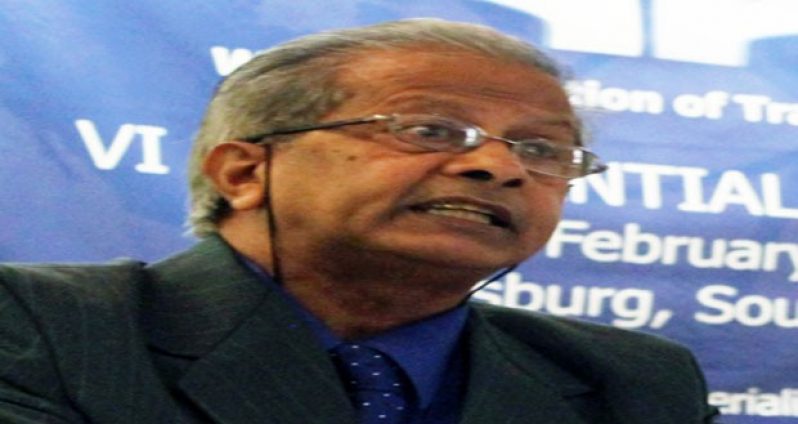IN responding to the recent calls for the privatisation of the sugar industry, President of the Guyana Agricultural Workers Union (GAWU), Komal Chand declared that the industry is more assured under the Government of Guyana.During an interview with the Guyana Chronicle yesterday, the head of the union which represents the majority of the sugar workers, said that, “if divested, whether to new owners, will the focus be shifted from sugar for example? It is not certain, but it depends upon the conditions the Government and new owners would agree to.”

This comes after economist and now Chairman of the Guyana Sugar Corporation (GuySuCo), Dr. Clive Thomas and veteran businessman Yesu Persaud suggested in sections of the media that the industry should be privatised.
Thomas had disclosed to sections of the media that the call for the privatisation of GuySuCo is probably the most widely recognised but contentious proposal ever put forward for the future of the industry. “This call always evokes intense political controversy,” he said.
“There is an ideological aspect to the privatisation proposal, which provokes this controversy. This is revealed in the axiomatic position taken by those who believe that State enterprises, and more so those based on agriculture activities, could never operate efficiently.
“The call for privatisation, therefore, seeks a drastic reversal of this fundamental commercial heresy, which GuySuCo embodies,” he wrote in one of his columns.
But Thomas believes that GuySuCo can enter private business with the aim of remaining financially viable. He believes that there are limitless opportunities where it could enter real estate, agricultural tourism and other forms of private enterprise with the use of its strong asset base.
Picking on the notion of the privatisation of the industry, Persaud highlighted that finding a buyer for the troubled GuySuCo is the most viable option for Government.
“In my opinion, if we can find a buyer who’s willing to take on those debts… because you have substantial assets – the land and factories etc. – take it over at a price, of course, that has to be negotiated, then I think there could be a future,” Persaud said after a meeting with the members of the Commission of Inquiry into the sugar industry yesterday.
He added that due to the $60B debt being carried by GuySuCo, it is more likely that there would have to be a move towards full privitisation as opposed to divestment and partial privatisation of the state company.
IMPLICATIONS
However, Chand pointed out some implications that could follow the privatisation of the industry, stating that one is the fact that it is the absorption of the largest workforce in Guyana. “Thousands depend on the sugar industry, 16-17 000 of workers are employed in the two harvesting periods, indirectly some others get jobs, suppliers like farmers who supply cane to some of the estates for instance.”
No entity, he contended, can absorb the amount of workers that the sugar industry has; jobs available by contractors might be an option but those are not long-term jobs, they last for temporary periods he said.

“We depend upon the sugar industry, communities get to be saddled with more rates and taxes, it is very much alleviated, and the part that GuySuCo plays is covering the rates and taxes in the sugar communities,” said the GAWU President.
Apart from that, GuySuCo deals with the drainage of those communities and if you risk closing the industry there could be a lot of social upheavals. “The consequences are very grave,” therefore it is best left in the hands of the Government.
BETTER MANAGEMENT
Chand stated that, “to get the industry back on its feet, to make it viable, it will take a few years if we start in earnest… there must be efficient management, particularly in the cane fields, where there has been neglect, standards have been dropped and good practices have been ignored.”
Going back to practices of the older days would prove beneficial, as the industry’s average production per hectare is merely 55 tonnes per sugar, while some farmers are achieving the minimum 80 tonnes per hectare.
Many farmers he highlighted are achieving this because they are using the correct variety (soil and chemicals), maintaining good practices, proper drainage and control of the weeds.
“It is not any performance GuySuCo is not aware of, since they have been in existence for over three and a half centuries, therefore, we ought to go back to the best practices…there has been neglect, inefficiency by management, whereby top managers are unware of the conditions in the field and they need to go back to how it was, go back to the fields to better analyse the situations,” he said.
ASSESSMENTS
Managers have to do their own assessments, have perimeters set and have targets based on those conditions. Do not wait until a long time, every week they could know what their end results are through Tonne of Cane per Tonne of Sugar (TCTS) and through the analysis of the sugar extracts.
The research department ought to be developed so that there could be a new cane variety to suit the changing weather conditions, while they should also move towards keeping factories in good order by having the basic spares readily available, in turn reducing downtimes; which has to do with repairing the factory while the crop is on. So this is a method of avoiding non-production during this time.
These, he noted, were some of the issues that were presented to the ongoing commission of inquiry into the industry, so there is still hope for the industry under the Government once the necessary issues are tackled in the right way.



.jpg)








